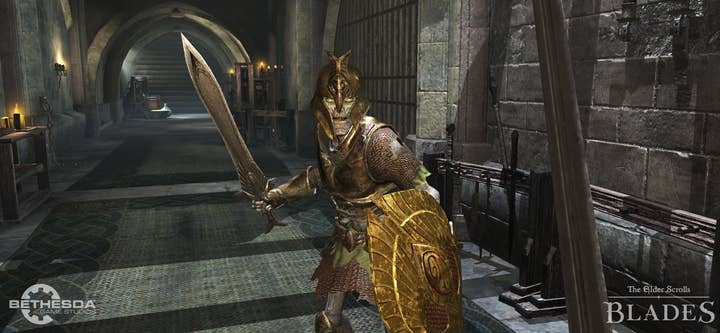Todd Howard: Service-based Fallout 76 doesn't mark the future direction of Bethesda
"Anyone who has ever said 'this is the future and this part of gaming is dead' has been proven wrong every single time"
Bethesda Game Studios remains one of the few big developers not owned by a platform holder that hasn't moved away from almost entirely single-player experiences into games-as-a-service.
While many major developers and publishers are still including single-player modes in their games, there is a clear trend away from this, sparking a recent debate around 'the death of single-player'.
Although the announcement that Fallout 76 will be a shared world survival game may have added credence to that argument, studio head Todd Howard says it doesn't represent a permanent departure for the company away from single-player experiences.
"It doesn't mark the future. Corporately we've done a mix; people forget sometimes"
"It doesn't mark the future," he tells GamesIndustry.biz during an interview at Gamelab Barcelona. "Corporately we've done a mix; people forget sometimes. Elder Scrolls online is one of the biggest online games in the world, we have Fallout Shelter which we keep updating, and Elder Scrolls: Legends.
"Anyone who has ever said 'this is the future and this part of gaming is dead' has been proven wrong every single time. We like to try it all. For a long time we wanted to try a multiplayer game and we had this idea. We shouldn't be afraid. We should try it."
Although both Starfield and the Elder Scrolls VI promise the sort of quintessentially Bethesda-style experience first demonstrated in 2002 with Morrowind, there is a clear games-as-a-service bent to the studio in recent years.
A newfound focus on mobile -- with games like Fallout Shelter, The Elder Scrolls: Legends and The Elder Scrolls: Blades -- shows that bosses at Bethesda see the commercial value of the platform. But as Howard says, Bethesda has typically employed a lighter touch with monetisation, contrary to the advice of consultants; an approach he intends to maintain with Blades.

"It's definitely a lighter touch, which surprisingly worked very well for us in Fallout Shelter," says Howard. "I was forced to meet with a lot of 'monetisation experts' during Fallout Shelter that didn't work for us. I said 'that's nice' and then it came out and the first week it was above Candy Crush with a very light touch... We did learn a lot though."
Howard says monetisation strategies needed to consider "a lot of areas of attack" that aren't just timer-based.
"How do we keep somebody who's playing the game a lot?" he adds. "How do we give them value beyond 'here's a timer, give us some money'?"
Mobile is also the key way to break into China, and that's obviously a market Howard hopes Bethesda can tap into more in the future.
"We're working with Shanda Games in China, which is doing an online version of Fallout Shelter there, so we've made some inroads," says Howard. "I think Blades, whereas it's not built for China per se, knowing their gaming tastes, it is definitely applicable in China and other parts of the world where Fallout Shelter and some other things we do are maybe not as much.
"It's one of those things where if you look at Chinese games, people will tell you they need to be like this, they need to have this art style they need to have crap all over the screen... But Blades, there's nothing else like it, but I view that as a positive to whatever market it's in."
GamesIndustry.biz is a media partner of the Gamelab conference. We have attended the show with the assistance of the organiser.
